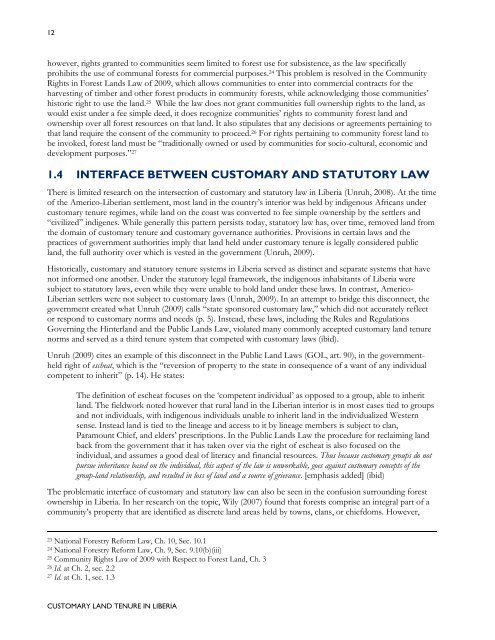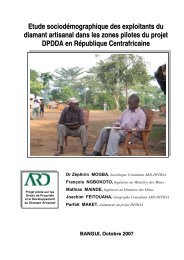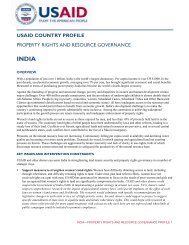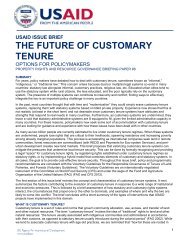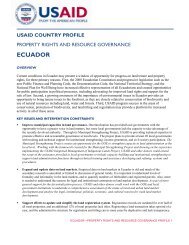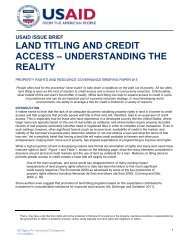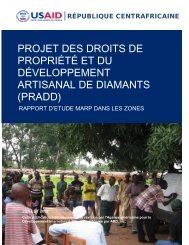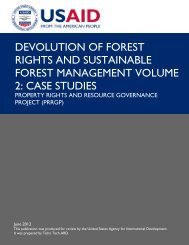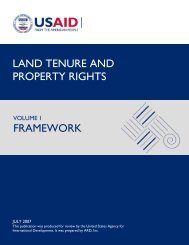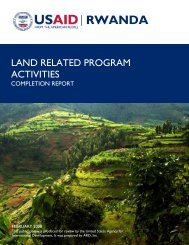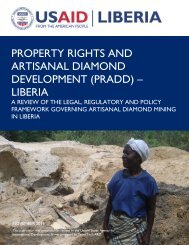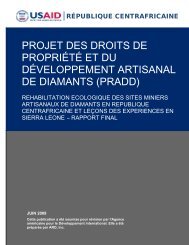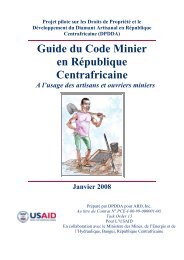Customary Land Tenure in Liberia - Land Tenure and Property ...
Customary Land Tenure in Liberia - Land Tenure and Property ...
Customary Land Tenure in Liberia - Land Tenure and Property ...
You also want an ePaper? Increase the reach of your titles
YUMPU automatically turns print PDFs into web optimized ePapers that Google loves.
12<br />
however, rights granted to communities seem limited to forest use for subsistence, as the law specifically<br />
prohibits the use of communal forests for commercial purposes. 24 This problem is resolved <strong>in</strong> the Community<br />
Rights <strong>in</strong> Forest <strong>L<strong>and</strong></strong>s Law of 2009, which allows communities to enter <strong>in</strong>to commercial contracts for the<br />
harvest<strong>in</strong>g of timber <strong>and</strong> other forest products <strong>in</strong> community forests, while acknowledg<strong>in</strong>g those communities‟<br />
historic right to use the l<strong>and</strong>. 25 While the law does not grant communities full ownership rights to the l<strong>and</strong>, as<br />
would exist under a fee simple deed, it does recognize communities‟ rights to community forest l<strong>and</strong> <strong>and</strong><br />
ownership over all forest resources on that l<strong>and</strong>. It also stipulates that any decisions or agreements perta<strong>in</strong><strong>in</strong>g to<br />
that l<strong>and</strong> require the consent of the community to proceed. 26 For rights perta<strong>in</strong><strong>in</strong>g to community forest l<strong>and</strong> to<br />
be <strong>in</strong>voked, forest l<strong>and</strong> must be “traditionally owned or used by communities for socio-cultural, economic <strong>and</strong><br />
development purposes.” 27<br />
1.4 INTERFACE BETWEEN CUSTOMARY AND STATUTORY LAW<br />
There is limited research on the <strong>in</strong>tersection of customary <strong>and</strong> statutory law <strong>in</strong> <strong>Liberia</strong> (Unruh, 2008). At the time<br />
of the Americo-<strong>Liberia</strong>n settlement, most l<strong>and</strong> <strong>in</strong> the country‟s <strong>in</strong>terior was held by <strong>in</strong>digenous Africans under<br />
customary tenure regimes, while l<strong>and</strong> on the coast was converted to fee simple ownership by the settlers <strong>and</strong><br />
“civilized” <strong>in</strong>digenes. While generally this pattern persists today, statutory law has, over time, removed l<strong>and</strong> from<br />
the doma<strong>in</strong> of customary tenure <strong>and</strong> customary governance authorities. Provisions <strong>in</strong> certa<strong>in</strong> laws <strong>and</strong> the<br />
practices of government authorities imply that l<strong>and</strong> held under customary tenure is legally considered public<br />
l<strong>and</strong>, the full authority over which is vested <strong>in</strong> the government (Unruh, 2009).<br />
Historically, customary <strong>and</strong> statutory tenure systems <strong>in</strong> <strong>Liberia</strong> served as dist<strong>in</strong>ct <strong>and</strong> separate systems that have<br />
not <strong>in</strong>formed one another. Under the statutory legal framework, the <strong>in</strong>digenous <strong>in</strong>habitants of <strong>Liberia</strong> were<br />
subject to statutory laws, even while they were unable to hold l<strong>and</strong> under these laws. In contrast, Americo-<br />
<strong>Liberia</strong>n settlers were not subject to customary laws (Unruh, 2009). In an attempt to bridge this disconnect, the<br />
government created what Unruh (2009) calls “state sponsored customary law,” which did not accurately reflect<br />
or respond to customary norms <strong>and</strong> needs (p. 5). Instead, these laws, <strong>in</strong>clud<strong>in</strong>g the Rules <strong>and</strong> Regulations<br />
Govern<strong>in</strong>g the H<strong>in</strong>terl<strong>and</strong> <strong>and</strong> the Public <strong>L<strong>and</strong></strong>s Law, violated many commonly accepted customary l<strong>and</strong> tenure<br />
norms <strong>and</strong> served as a third tenure system that competed with customary laws (ibid).<br />
Unruh (2009) cites an example of this disconnect <strong>in</strong> the Public <strong>L<strong>and</strong></strong> Laws (GOL, art. 90), <strong>in</strong> the governmentheld<br />
right of escheat, which is the “reversion of property to the state <strong>in</strong> consequence of a want of any <strong>in</strong>dividual<br />
competent to <strong>in</strong>herit” (p. 14). He states:<br />
The def<strong>in</strong>ition of escheat focuses on the „competent <strong>in</strong>dividual‟ as opposed to a group, able to <strong>in</strong>herit<br />
l<strong>and</strong>. The fieldwork noted however that rural l<strong>and</strong> <strong>in</strong> the <strong>Liberia</strong>n <strong>in</strong>terior is <strong>in</strong> most cases tied to groups<br />
<strong>and</strong> not <strong>in</strong>dividuals, with <strong>in</strong>digenous <strong>in</strong>dividuals unable to <strong>in</strong>herit l<strong>and</strong> <strong>in</strong> the <strong>in</strong>dividualized Western<br />
sense. Instead l<strong>and</strong> is tied to the l<strong>in</strong>eage <strong>and</strong> access to it by l<strong>in</strong>eage members is subject to clan,<br />
Paramount Chief, <strong>and</strong> elders‟ prescriptions. In the Public <strong>L<strong>and</strong></strong>s Law the procedure for reclaim<strong>in</strong>g l<strong>and</strong><br />
back from the government that it has taken over via the right of escheat is also focused on the<br />
<strong>in</strong>dividual, <strong>and</strong> assumes a good deal of literacy <strong>and</strong> f<strong>in</strong>ancial resources. Thus because customary groups do not<br />
pursue <strong>in</strong>heritance based on the <strong>in</strong>dividual, this aspect of the law is unworkable, goes aga<strong>in</strong>st customary concepts of the<br />
group-l<strong>and</strong> relationship, <strong>and</strong> resulted <strong>in</strong> loss of l<strong>and</strong> <strong>and</strong> a source of grievance. [emphasis added] (ibid)<br />
The problematic <strong>in</strong>terface of customary <strong>and</strong> statutory law can also be seen <strong>in</strong> the confusion surround<strong>in</strong>g forest<br />
ownership <strong>in</strong> <strong>Liberia</strong>. In her research on the topic, Wily (2007) found that forests comprise an <strong>in</strong>tegral part of a<br />
community‟s property that are identified as discrete l<strong>and</strong> areas held by towns, clans, or chiefdoms. However,<br />
23 National Forestry Reform Law, Ch. 10, Sec. 10.1<br />
24 National Forestry Reform Law, Ch. 9, Sec. 9.10(b)(iii)<br />
25 Community Rights Law of 2009 with Respect to Forest <strong>L<strong>and</strong></strong>, Ch. 3<br />
26 Id. at Ch. 2, sec. 2.2<br />
27 Id. at Ch. 1, sec. 1.3<br />
CUSTOMARY LAND TENURE IN LIBERIA


